Lisa Wysocky's Blog
June 24, 2014
Awards
The Magnum Equation
, my second mystery, just won Best Equine-related Book from the American Horse Publications and three days later I am still stunned. This is the fifth award for the series and we are just two books in. Two awards are still pending.
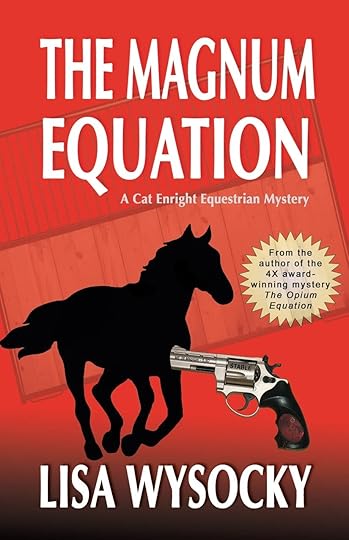
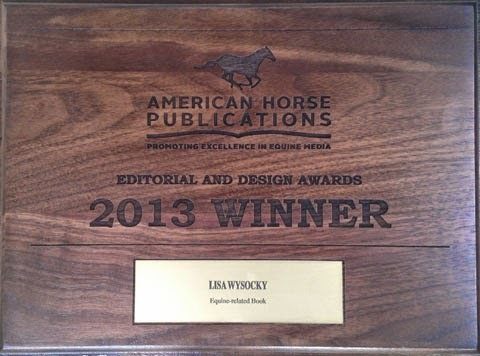
One reason I am so amazed is that it took me seventeen years to get the first book in the series, The Opium Equation, published. Cat Enright, my main character, stayed in my head all those years, and she was sure her stories would eventually see the light of day, even if I wasn't quite so positive. As often happens, though, the right publisher came along a the right time, and here we are. I just received the option agreement on the third book in the series and Cat and I are hard at work crafting another of her mysterious adventures.
It is a true privilege to be recognized for achievement, particularly one as special as this. I was fortunate to have my good friend and publisher Cindy Johnson from Cool Titles, and the fabulous Kaye Marks of PATH (Professional Association of Therapeutic Horsemanship) to celebrate the award with me, and the experience would not have been nearly as sweet without them.
In several months we will learn the fate of the book in the other two award competitions. In the meantime, I will treasure this huge achievement, and stay busy with Cat, as her third mystery comes to life. Oh, and if you'd like to read Cat's take on the award, you can hop on over to her blog.


One reason I am so amazed is that it took me seventeen years to get the first book in the series, The Opium Equation, published. Cat Enright, my main character, stayed in my head all those years, and she was sure her stories would eventually see the light of day, even if I wasn't quite so positive. As often happens, though, the right publisher came along a the right time, and here we are. I just received the option agreement on the third book in the series and Cat and I are hard at work crafting another of her mysterious adventures.
It is a true privilege to be recognized for achievement, particularly one as special as this. I was fortunate to have my good friend and publisher Cindy Johnson from Cool Titles, and the fabulous Kaye Marks of PATH (Professional Association of Therapeutic Horsemanship) to celebrate the award with me, and the experience would not have been nearly as sweet without them.
In several months we will learn the fate of the book in the other two award competitions. In the meantime, I will treasure this huge achievement, and stay busy with Cat, as her third mystery comes to life. Oh, and if you'd like to read Cat's take on the award, you can hop on over to her blog.
Published on June 24, 2014 08:21
May 5, 2014
Hip Hop Author/Writer Blog
I am so excited this week to be part of the Hip Hop Blog tour, a series of blogs where writers/authors answer questions about their writing process. Linda Benson, author of The Girl Who Remembered Horses, Six Degrees of Lost, Walking the Dog, and moreas well as a new series of short fiction called Cat Tales posted hers last week and tagged me to participate. You can check out her writing process HERE.
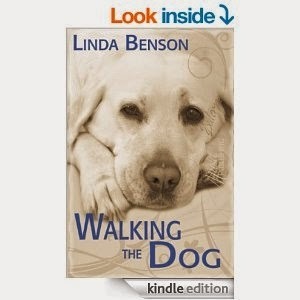
The questions are the same for all of us, so if you are interested in writing, or a particular author or genre of book, the links provided in each blog will allow you to “hop” around as much as you wish. Here goes!
What am I working on?
I’m working on two books that I am writing, and two that I am editing. First, I am writing the third in my award-winning cozy equestrian mystery series. I am so honored that, combined, the first two in the series have won five awards, including two from American Horse Publications. My protagonist is a female horse trainer who has surrounded herself with a wacky cast of characters including a seventy-year-old cheerleader and a (possibly) psychic horse. It is set in rural Tennessee, so I have a wealth of odd personalities to draw from! Look for The Fame Equation in 2015. I am also finishing a book on therapy horse selection. What makes a good therapy horse, what should you look for when you first look at the horse, and from a donor perspective, would a therapeutic riding center be interested in my horse? That one will be out in August.
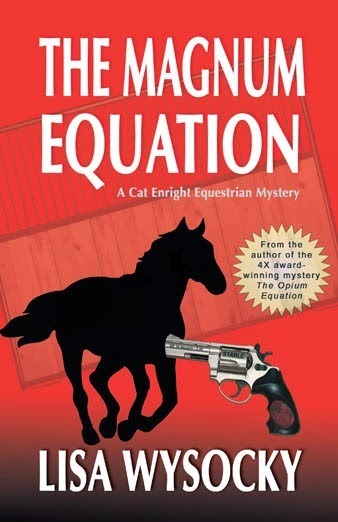
The first book I am editing is a fascinating look at the difference between Supreme Court decisions and Hollywood films and how each has treated women over the past 100 years. The “result” might surprise you Gender Results was written by California Appellate Court Justice Eileen Moore and will be published later this year. The other is an autobiography from Olympian and world-class 800-meter runner Nick Symmonds, who gives an inside look at the sport of running. I love being able to help shape books at the developmental level and see my impact in the final product.
How does my work differ from others of its genre?
I love cozy mysteries and putting that genre into a Southern equestrian setting with a number of eccentric human characters, a howling dog, an intuitive horse, and little humor makes for a fun write, and (hopefully) a fun read! With the nonfiction horse books I strive to be informative, visual, and entertaining. Some other books in that area hit any two out of the three, often not in any reflection of the author, but in the publisher’s vision of the final product. I have been very fortunate to work with publishers who bring my ideas of the book’s design into the mix with their own and I have been very happy with the results. The purpose of the autobiographies is to give a voice to someone who has an important story to share. I try to write in my co-authors’ voice, and phrase sentences the way he or she might phrase them. While written and spoken language often differ, a good balance between co-author phrasing and good written grammar is the goal. It’s a fact that few of us speak as correctly as we write!
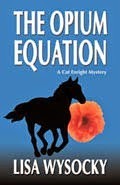
Why do I write what I do? I write nonfiction about horses because horses have fascinated me from the time I was a small child. Since then I have learned how much they have to teach us and I hope that my writing will pass on some of the important life lessons horses have taught me. I chose mystery as my genre of fiction because, as a child, I could never get enough of Nancy Drew or the Hardy Boys. When my mother gave me a Dick Francis mystery when I was twelve, and I realized that I could marry mystery and horses, I knew that was what I wanted to do. When I co-author autobiographies, I choose people who have overcome tremendous odds. I have always rooted for the underdog, and I am so inspired by my co-authors, people such as Brad Cohen, Fred Gill, Lyssa Chapman, and Shyima Hall, who have endured enormous hardships and still managed to come out of it with a positive attitude. Those people, and many others like them, keep me going whenever life throws me a curve ball.
How does your writing process work? First, I have to have an orderly space in which to write. Too much visual clutter seems to clutter my mind. I try to write in the morning, when my mind is fresh, and will write for several hours without a break. I rarely have writer’s block, but when I do, I get up, take a walk, wash dishes, or do something to take my mind off the block. Invariably, within ten minutes or so, I know exactly where the story needs to go. I outline my nonfiction extensively, because publishers usually buy a nonfiction book based on a proposal, which includes chapter summaries. The publisher then expects the finished book to be a fleshed-out version of the chapter summaries. With fiction, I just write. I start with an idea or a problem. What would happen if . . . ? How would my character react if . . . ? I usually know who the victim and murderer are, and why the victim was murderedbut once I get going, my characters take over inside my head. I just write what they tell me. :-)
~~~
And now, here are two wonderful authors whom I adore and who have written books that I love. Please stop by their blogs and become a follower (they will be posting about their writing process next week and you won’t want to miss any stellar advice they have).
Sharon Woods Hopkins is a life-long horse lover and the author of the Rhetta McCarter mystery series. Sharon lives in Missouri with her author husband, Bill Hopkins, and is a mortgage office who owns the original Cami, the 1979 Camaro RS featured in her Rhetta McCarter mystery series. Check out her books Killertrust , Killerwatt , and Killerfind .
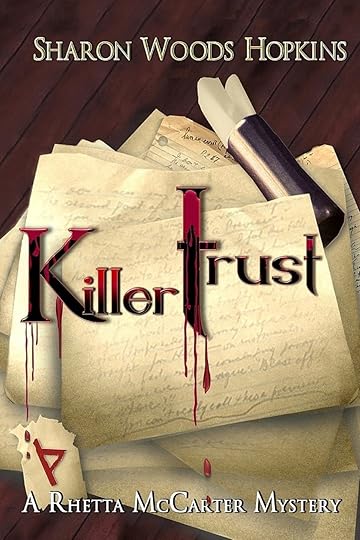
On or after May 12, 2014, check out her blog at:
Devon O’Day writes books that inspire, whether about pets, love or cooking. She has been the producer of the number one country music morning show in America and the host of the syndicated Country Hitmakers, heard in 130 markets. A successful songwriter, O'Day wrote the number one song by George Strait, “The Big One.” She speaks about animal rescue to corporations and organizations around the country, and lives with her horses, dogs, and cats just outside Nashville. Check out Goodbye My Friend, My Angels Wear Fur, and My Southern Food: A Celebration of Flavors of the South .
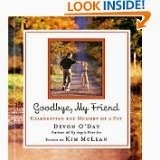
On or after May 12, 2014, check out her blog at:
Published on May 05, 2014 11:56
November 29, 2013
Grateful Thanks!
This is a time of year to give thanks and I want to say how very grateful I am for all of you. Those of us who are full-time authors and speakers rely on you to help spread the word about our books and events. If our books do not sell, if we do not get booked to share our knowledge and experience at events, then mortgages and electric bills cannot be paid, and food cannot be put on the table. That’s why I am truly thankful to everyone who has purchased a book, come to an event, or told a friend about me. I have been writing and speaking full time for more than ten years and it is only because of you that I can continue to do this. Thank you!!!!
People often ask how they can help me, or other authors and speakers, and there really are a lot of ways:
1. Like us on Facebook. I have two Facebook pages: facebook.com/lisawysocky for people I know (or at least have met), and facebook.com/thepowerofawhisper, where horseman Sam Powell and I give tips about horses and life. The way this business works is the more Facebook followers or Twitter followers an author/speaker has, the more likely he or she is to get booked. Also, the author’s agent or representative has an easier time in structuring good book and sponsorship deals.
2. Follow us on Twitter. Same principle, the more the better! I am on Twitter @lisawysocky. I cannot stress how important having a lot of social media followers is to people like me. Other sites you can follow someone on are: Linkedin and Google+, and there are a host of opportunities at Goodreads.com. Just search for your favorite people, they should pop up.
3. Like, share, and comment on our posts. When a prospective agent or publisher looks over our social media pages, they like to see an active and engaged audience. Same goes for anyone who books us for an event. It only takes a second to share a post or tweet, and less than a minute to personally tell a friend about us, but it means a lot. Writing is a time consuming task and authors do not always have the time we need to attend to all of our social media. If we are posting or tweeting, then we are not working on our manuscript’s word count for the day, or revising our next speech.
4. If we are in a city near you, please come see us––and bring lots of friends and neighbors. If you can’t make it, encourage others to attend. Just like every other author or speaker out there, I understand how difficult it is to break away from your daily routine of work and family. That’s why I am thrilled to see you walk in the door to an event. Besides, you might even have a fabulous time, and who knows what other cool people you will meet!
5. Book us for an event, and there are many forms of this:
• Host an author for an afternoon tea in your home or church––and invite all of your friends (if nearby, most authors will come free if they can also sell books)
• Gather your class or book club for a phone or Skype chat with an author. Again, there is usually no cost involved in this.
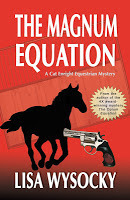
• Most authors also speak on topics that relate to their books, so think creatively to figure out how your favorite author can impact your annual meeting, regional or national conference, training day, quarterly sales meeting, or other event. Find author and speaker contacts through their website to determine the correct person to ask about content, fees, and scheduling. (Fine mine at LisaWysocky.com/contact)I help people with horses learn more about themselves and their horse, and I also help non-horse people at corporations and associations learn amazing leadership lessons from the horse herd. I love doing this and know other authors have incredible information to share as well.
6. Buy a book, or three or ten. A great book can become a treasured item. Books also make great gifts. Libraries are always looking for donations of new books, and this includes school and private libraries, as well as your local public library. When it comes to people who don’t read, a wise librarian once told me that the non-readers had not yet discovered a book with information on a subject they were passionate about. You could be the person to open the door to a brand new world, and all it takes is handing someone the right book.
7. Write an online review on the book’s page on one of the major book seller sites. Quality reader reviews help other readers find books they will enjoy. Plus, an honest, helpful review shows publishers and event planners that the author has an engaged audience, and that there is interest in his or her work.
When it comes down to it, for publishers, it is all about the bottom line, and rightly so. Publishers have to make a living, too. If books do not sell, authors are not invited to write additional books. The ultimate result is that many wise and creative people can no longer make a living doing something they love and are very good at doing. That’s why good sales numbers are so very, very important. That’s also why I am so thankful for you, for all the support you have shown me throughout the years. Truly, I would not be here without you. Kudos to you all.
Lisa
People often ask how they can help me, or other authors and speakers, and there really are a lot of ways:
1. Like us on Facebook. I have two Facebook pages: facebook.com/lisawysocky for people I know (or at least have met), and facebook.com/thepowerofawhisper, where horseman Sam Powell and I give tips about horses and life. The way this business works is the more Facebook followers or Twitter followers an author/speaker has, the more likely he or she is to get booked. Also, the author’s agent or representative has an easier time in structuring good book and sponsorship deals.
2. Follow us on Twitter. Same principle, the more the better! I am on Twitter @lisawysocky. I cannot stress how important having a lot of social media followers is to people like me. Other sites you can follow someone on are: Linkedin and Google+, and there are a host of opportunities at Goodreads.com. Just search for your favorite people, they should pop up.
3. Like, share, and comment on our posts. When a prospective agent or publisher looks over our social media pages, they like to see an active and engaged audience. Same goes for anyone who books us for an event. It only takes a second to share a post or tweet, and less than a minute to personally tell a friend about us, but it means a lot. Writing is a time consuming task and authors do not always have the time we need to attend to all of our social media. If we are posting or tweeting, then we are not working on our manuscript’s word count for the day, or revising our next speech.
4. If we are in a city near you, please come see us––and bring lots of friends and neighbors. If you can’t make it, encourage others to attend. Just like every other author or speaker out there, I understand how difficult it is to break away from your daily routine of work and family. That’s why I am thrilled to see you walk in the door to an event. Besides, you might even have a fabulous time, and who knows what other cool people you will meet!
5. Book us for an event, and there are many forms of this:
• Host an author for an afternoon tea in your home or church––and invite all of your friends (if nearby, most authors will come free if they can also sell books)
• Gather your class or book club for a phone or Skype chat with an author. Again, there is usually no cost involved in this.

• Most authors also speak on topics that relate to their books, so think creatively to figure out how your favorite author can impact your annual meeting, regional or national conference, training day, quarterly sales meeting, or other event. Find author and speaker contacts through their website to determine the correct person to ask about content, fees, and scheduling. (Fine mine at LisaWysocky.com/contact)I help people with horses learn more about themselves and their horse, and I also help non-horse people at corporations and associations learn amazing leadership lessons from the horse herd. I love doing this and know other authors have incredible information to share as well.
6. Buy a book, or three or ten. A great book can become a treasured item. Books also make great gifts. Libraries are always looking for donations of new books, and this includes school and private libraries, as well as your local public library. When it comes to people who don’t read, a wise librarian once told me that the non-readers had not yet discovered a book with information on a subject they were passionate about. You could be the person to open the door to a brand new world, and all it takes is handing someone the right book.
7. Write an online review on the book’s page on one of the major book seller sites. Quality reader reviews help other readers find books they will enjoy. Plus, an honest, helpful review shows publishers and event planners that the author has an engaged audience, and that there is interest in his or her work.
When it comes down to it, for publishers, it is all about the bottom line, and rightly so. Publishers have to make a living, too. If books do not sell, authors are not invited to write additional books. The ultimate result is that many wise and creative people can no longer make a living doing something they love and are very good at doing. That’s why good sales numbers are so very, very important. That’s also why I am so thankful for you, for all the support you have shown me throughout the years. Truly, I would not be here without you. Kudos to you all.
Lisa
Published on November 29, 2013 10:41
March 28, 2013
The Black Hole
Many of you have heard of the black hole that is my basement. It started as a storage place for my inventory of books and merchandise, trade show booth, and household items such as Christmas ornaments, but over the years developed into a bottomless pit of “stuff.” Need a table top ironing board? How about a music stand? I have several of those. A tricycle? Yep. Old tire? Check. Cardboard shield, dagger, and tiara, complete with sequins? Of course. Macramé plant holder, cloth calendar from 1974, rotary dial phone, various lengths of 2” metal pipe, three bridles broken beyond repair, a roll of black burlap, fourteen hammers . . . the list goes on, and on.
 This year I am taking the idea of “spring cleaning” to another level. In addition to opening the windows, letting in the fresh air and shaking out the rugs (something I actually do not have any of) I am tackling the black hole. The only things that get to stay are those that are useful, decorative, or have sentimental value. I know it will be a process, but focusing just fifteen minutes a day has already made a huge improvement. I sort into four piles: give to friends, Goodwill, trash, and keep.
This year I am taking the idea of “spring cleaning” to another level. In addition to opening the windows, letting in the fresh air and shaking out the rugs (something I actually do not have any of) I am tackling the black hole. The only things that get to stay are those that are useful, decorative, or have sentimental value. I know it will be a process, but focusing just fifteen minutes a day has already made a huge improvement. I sort into four piles: give to friends, Goodwill, trash, and keep.
While hopefully not as large, most people have their own version of a black hole. It might be the back of a closet, the corner of a tack room, or an entire storage shed, but you’ve been putting off tackling the mess for months––or even years. I know that if I can get through my black hole, you can, too. So go ahead, budget fifteen minutes and see how far you get,. In addition, be prepared to be amazed at the things you find and how much you can accomplish.
 This year I am taking the idea of “spring cleaning” to another level. In addition to opening the windows, letting in the fresh air and shaking out the rugs (something I actually do not have any of) I am tackling the black hole. The only things that get to stay are those that are useful, decorative, or have sentimental value. I know it will be a process, but focusing just fifteen minutes a day has already made a huge improvement. I sort into four piles: give to friends, Goodwill, trash, and keep.
This year I am taking the idea of “spring cleaning” to another level. In addition to opening the windows, letting in the fresh air and shaking out the rugs (something I actually do not have any of) I am tackling the black hole. The only things that get to stay are those that are useful, decorative, or have sentimental value. I know it will be a process, but focusing just fifteen minutes a day has already made a huge improvement. I sort into four piles: give to friends, Goodwill, trash, and keep.While hopefully not as large, most people have their own version of a black hole. It might be the back of a closet, the corner of a tack room, or an entire storage shed, but you’ve been putting off tackling the mess for months––or even years. I know that if I can get through my black hole, you can, too. So go ahead, budget fifteen minutes and see how far you get,. In addition, be prepared to be amazed at the things you find and how much you can accomplish.
Published on March 28, 2013 16:07
January 24, 2013
Risk
My new memoir, Horseback, is now out in paperback and kindle versions. The book details my early years with horses, roughly the years when I was thirteen to twenty-three (or so). Over the years I had told many of the stories that are now in the book and with much hesitation finally decided to group them together in writing. Horseback is the result.

My hesitation came from the fact that my early years with horses were filled with stupid mistakes on my part. In many cases it was like the blind leading the blind as neither the horse or I knew what we were supposed to do. I was afraid that readers would not take my openness about my lack of ability in the positive way I wanted––for I very much hoped that readers would learn as much from my errors as I did. And, maybe enjoy a laugh or two along the way.
That's the thing about risk. It is always a gamble, if a calculated one. If I did the book, readers could possibly look at me and rightly think "Does she even have a brain?" Or, they might think "You know, I thought about trying that once . . . glad I didn't."
Hmmm. What to do? With the idea of nothing ventured nothing gained, I wrote the book. To my delight, the response has been overwhelmingly positive. And the thing readers are most positive about? The fact that I was willing to share my mistakes with them. Horseback forced me to step outside of my comfort zone and you know what? It's not a bad place to be. I hope that you, too, will add a little risk to your life in the coming months and do something (safe) that pushes your boundaries a bit. Then, I hope you will let me know how it goes.
Until next time,
Lisa

My hesitation came from the fact that my early years with horses were filled with stupid mistakes on my part. In many cases it was like the blind leading the blind as neither the horse or I knew what we were supposed to do. I was afraid that readers would not take my openness about my lack of ability in the positive way I wanted––for I very much hoped that readers would learn as much from my errors as I did. And, maybe enjoy a laugh or two along the way.
That's the thing about risk. It is always a gamble, if a calculated one. If I did the book, readers could possibly look at me and rightly think "Does she even have a brain?" Or, they might think "You know, I thought about trying that once . . . glad I didn't."
Hmmm. What to do? With the idea of nothing ventured nothing gained, I wrote the book. To my delight, the response has been overwhelmingly positive. And the thing readers are most positive about? The fact that I was willing to share my mistakes with them. Horseback forced me to step outside of my comfort zone and you know what? It's not a bad place to be. I hope that you, too, will add a little risk to your life in the coming months and do something (safe) that pushes your boundaries a bit. Then, I hope you will let me know how it goes.
Until next time,
Lisa
Published on January 24, 2013 12:29
September 10, 2012
Helmet Perspectives
When I was young, my friends and I rode our horses through fields and trails just about every day. We'd take our horses swimming, jump fences, play cowboys and Indians, and make a valiant effort to play polo. Not once, not at any time, did any of us ever wear a helmet. Not when we sat backwards on our horses, bareback, to read our homework assignments when our horses were grazing freely in the pasture. Not when we tried (without success) to slide off our horse's back and under their bellies, then scramble onto their back from the other side––all without touching the ground. And certainly not when we raced up the red gravel hill of County Line Road, three or four abreast across both lanes. I remember one day when a friend and I not only practiced standing on the bare backs of our horses while they were moving, we decided to go tandem, two horses with two helmet-less people, our left feet on one horse and right on the other. It didn't seem to matter that one horse was 14.1 and the other 16 hands.
Today, I am horrified and can't imagine even doing most of those things. I certainly do not recommend them now, even though we had a lot of fun and I can't recall that anyone, horse or human got hurt. The potential for disaster, though, was extremely high. All I can say is that we must have worked our guardian angels way past overtime.
The other day I was in my barn getting ready to ride my mare. Tessie is an unflappable Belgian/Quarter Horse cross and I'd feel completely comfortable with a six-year-old riding her. When I ride her, we typically walk/trot around the arena in school horse fashion and work on leg yields and bending. As a former driving horse, these are major gaps in Tessie's education.
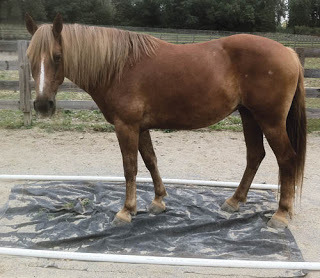 Just as I was putting my sunglasses on I realized I couldn't find my helmet. Oh, well, I thought, I'll ride just this once without it. Tessie is perfectly safe. But Tessie and I got half-way to the arena when I stopped. I couldn't do it. I knew I couldn't get on this, arguably one of the safest horses in the world, without a helmet. So, we trudged back to the bar and I pulled out a helmet that was several years old. It was heavier than my new helmet, not as comfortable, not as attractive, but I could not get on my horse, any horse, without it.
Just as I was putting my sunglasses on I realized I couldn't find my helmet. Oh, well, I thought, I'll ride just this once without it. Tessie is perfectly safe. But Tessie and I got half-way to the arena when I stopped. I couldn't do it. I knew I couldn't get on this, arguably one of the safest horses in the world, without a helmet. So, we trudged back to the bar and I pulled out a helmet that was several years old. It was heavier than my new helmet, not as comfortable, not as attractive, but I could not get on my horse, any horse, without it.
I've been riding for forty-nine years and have trained horses professionally for most of my adult life. The difference between now, and the child rider that I was, is perspective. Over the years, I have seen many falls when the helmet saved the rider. I have seen so many unforeseen, freak accidents that I know that anything can happen at any time. As safe as Tessie is, as experienced as I am, I know the next accident could be a simple stumble away. That's why you will never see me ride without the protection of a helmet, because I value life, my life, too much.
Today, I am horrified and can't imagine even doing most of those things. I certainly do not recommend them now, even though we had a lot of fun and I can't recall that anyone, horse or human got hurt. The potential for disaster, though, was extremely high. All I can say is that we must have worked our guardian angels way past overtime.
The other day I was in my barn getting ready to ride my mare. Tessie is an unflappable Belgian/Quarter Horse cross and I'd feel completely comfortable with a six-year-old riding her. When I ride her, we typically walk/trot around the arena in school horse fashion and work on leg yields and bending. As a former driving horse, these are major gaps in Tessie's education.
 Just as I was putting my sunglasses on I realized I couldn't find my helmet. Oh, well, I thought, I'll ride just this once without it. Tessie is perfectly safe. But Tessie and I got half-way to the arena when I stopped. I couldn't do it. I knew I couldn't get on this, arguably one of the safest horses in the world, without a helmet. So, we trudged back to the bar and I pulled out a helmet that was several years old. It was heavier than my new helmet, not as comfortable, not as attractive, but I could not get on my horse, any horse, without it.
Just as I was putting my sunglasses on I realized I couldn't find my helmet. Oh, well, I thought, I'll ride just this once without it. Tessie is perfectly safe. But Tessie and I got half-way to the arena when I stopped. I couldn't do it. I knew I couldn't get on this, arguably one of the safest horses in the world, without a helmet. So, we trudged back to the bar and I pulled out a helmet that was several years old. It was heavier than my new helmet, not as comfortable, not as attractive, but I could not get on my horse, any horse, without it.I've been riding for forty-nine years and have trained horses professionally for most of my adult life. The difference between now, and the child rider that I was, is perspective. Over the years, I have seen many falls when the helmet saved the rider. I have seen so many unforeseen, freak accidents that I know that anything can happen at any time. As safe as Tessie is, as experienced as I am, I know the next accident could be a simple stumble away. That's why you will never see me ride without the protection of a helmet, because I value life, my life, too much.
Published on September 10, 2012 08:07
May 4, 2012
Fan Mail and Email
I am starting to get a lot of fan mail and I have discovered that it might not be what you think. Here are a few samples from the last few months. Enjoy!
Dear Lisa,
Just because you have 746 “friends” on Facebook and I don’t does not mean you are a good writer. Thought you should know that.
Dear Reader: Gee, thanks for the heads-up.
Dear Lisa,
You are such a great writer but, can you write sadder books? Just go with anything from your sad place. My husband left me and I don’t want to read any books that are fun or funny. Well, he wasn’t really my husband. He was a Louie, but he still left me.
Dear Reader: Um . . . have you tried counseling?
Dear Cat,
The exact same thing happened to me that happened to you! OMG! How did you no that? How did you know enough about ME to live MY life? Only it wasn’t my neighbor that got kilt and my friends didn’t help me. And I don’t live in Tennessee. I also don't I drive a truck. So you got a lot of it VERY wrong!!! I didn’t even know the person who was murdered. I just red about it in the paper.
Dear Reader: You do understand that Cat is a fictional character? You should also know that fictional characters often don’t respond when you write to them.
Dear Laura,
I love your books. I love that you are such a fabulous writer. I love that you trail ride to the beach, and I love the photo of you riding a palomino on your back cover. And I especially love your book that had the barn fire in it.
Dear Reader: I love the fact that you meant to write to Laura Crum but sent it to me instead. Thanks!
Dear Lisa,
Please send me a signed copy of your book. But don’t sign it to me. Sign it to my wife. Her birthday is next week. If you send me the book then I don’t have to shell out any dough for a gift.
Dear Reader: Here’s a hint: Amazon.com.
Dear Lisa,
I can’t remember why I wanted to write to you so forget I even sent this email to you. Yeah, just forget it.
Dear Reader: Oh yeah. Forgotten. Totally forgotten.

Dear Lisa,
Just because you have 746 “friends” on Facebook and I don’t does not mean you are a good writer. Thought you should know that.
Dear Reader: Gee, thanks for the heads-up.
Dear Lisa,
You are such a great writer but, can you write sadder books? Just go with anything from your sad place. My husband left me and I don’t want to read any books that are fun or funny. Well, he wasn’t really my husband. He was a Louie, but he still left me.
Dear Reader: Um . . . have you tried counseling?
Dear Cat,
The exact same thing happened to me that happened to you! OMG! How did you no that? How did you know enough about ME to live MY life? Only it wasn’t my neighbor that got kilt and my friends didn’t help me. And I don’t live in Tennessee. I also don't I drive a truck. So you got a lot of it VERY wrong!!! I didn’t even know the person who was murdered. I just red about it in the paper.
Dear Reader: You do understand that Cat is a fictional character? You should also know that fictional characters often don’t respond when you write to them.
Dear Laura,
I love your books. I love that you are such a fabulous writer. I love that you trail ride to the beach, and I love the photo of you riding a palomino on your back cover. And I especially love your book that had the barn fire in it.
Dear Reader: I love the fact that you meant to write to Laura Crum but sent it to me instead. Thanks!
Dear Lisa,
Please send me a signed copy of your book. But don’t sign it to me. Sign it to my wife. Her birthday is next week. If you send me the book then I don’t have to shell out any dough for a gift.
Dear Reader: Here’s a hint: Amazon.com.
Dear Lisa,
I can’t remember why I wanted to write to you so forget I even sent this email to you. Yeah, just forget it.
Dear Reader: Oh yeah. Forgotten. Totally forgotten.
Published on May 04, 2012 07:03
April 16, 2012
Awards!
The Opium Equation
, my equestrian mystery has been recognized by two wonderful organizations. It recently was awarded the silver medal for fiction from The Mom's Choice Awards®, and is a finalist in the American Horse Publications awards in their book category.
This is especially exciting to me because I tried for seventeen years to get the book published, one rewrite and agent after the other. I had pretty much given up on the book when a publisher stepped up and took a chance. I am eternally grateful to them, but I am also grateful for all of the rejection slips, all the literary agents who passed, and also those who tried, but could not interest a publisher.
Each of those "failures" caused me to take another look at the book and either add or delete something important. Over the years characters were refined and plot lines expanded and the book would not be nearly what it is today if it were not for the early passes.
I have found two lessons in this. The first is if you really believe in something, never give up. Even if you never achieve your goal, there is significant value in the journey. The second is to consider the opinions of others. You do not have to act of their opinions, but all opinions regarding your goal are good to think about.
That said, I am tremendously excited about the awards! It is nice to know others value your efforts and being recognized in this way is fabulous.
This is especially exciting to me because I tried for seventeen years to get the book published, one rewrite and agent after the other. I had pretty much given up on the book when a publisher stepped up and took a chance. I am eternally grateful to them, but I am also grateful for all of the rejection slips, all the literary agents who passed, and also those who tried, but could not interest a publisher.
Each of those "failures" caused me to take another look at the book and either add or delete something important. Over the years characters were refined and plot lines expanded and the book would not be nearly what it is today if it were not for the early passes.
I have found two lessons in this. The first is if you really believe in something, never give up. Even if you never achieve your goal, there is significant value in the journey. The second is to consider the opinions of others. You do not have to act of their opinions, but all opinions regarding your goal are good to think about.
That said, I am tremendously excited about the awards! It is nice to know others value your efforts and being recognized in this way is fabulous.
Published on April 16, 2012 09:24
March 8, 2012
Mixed Signals
I recently had an MRI on my knee, the right, knee, the knee that has already seen seven surgeries. As I lay on the table, I was told to relax and hold as still as possible. Then I was given a set of heavy headphones. And what was playing through those headphones? Disco music! Now how could I possibly relax with Donna Summer encouraging me to get up and dance? I tried to tune out all audio (Donna was competing with the clunks and clanks of the MRI machine) and for the next twenty-five minutes I concentrated on my deep breathing exercises. Breathe in, count to six, breathe out, count to six.
I also began to think of the many times we give people (and our four-legged friends) mixed signals. Telling someone they did a good job without smiling, asking our horse to stop while leaning forward and squeezing with our legs, giving a firm directive, such as "No," said with the upward inflection of a question mark at the end of the word.
Our entire lives are made up of mixed signals and I, for one, have begun to really think through what I do and how I do it. It is a mentally tiresome process for me, or at least it was at first. With practice, it has begun to be easier. And, with my clarity of signals, I have found a clarity of thought that was missing before. My relationships with my horses are tighter, as are those with the people around me. And now, before I have that eighth surgery, I am going to crank me up some Donna and dance!
I also began to think of the many times we give people (and our four-legged friends) mixed signals. Telling someone they did a good job without smiling, asking our horse to stop while leaning forward and squeezing with our legs, giving a firm directive, such as "No," said with the upward inflection of a question mark at the end of the word.
Our entire lives are made up of mixed signals and I, for one, have begun to really think through what I do and how I do it. It is a mentally tiresome process for me, or at least it was at first. With practice, it has begun to be easier. And, with my clarity of signals, I have found a clarity of thought that was missing before. My relationships with my horses are tighter, as are those with the people around me. And now, before I have that eighth surgery, I am going to crank me up some Donna and dance!
Published on March 08, 2012 08:25
June 14, 2011
Central Park Carriages
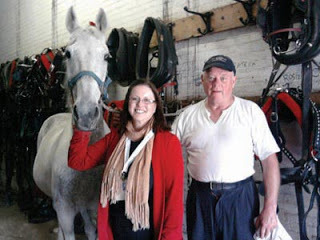 Romeo, Lisa, and Cornelius Byrne
Romeo, Lisa, and Cornelius ByrneOn a recent trip to New York I had the great fortune to stumble upon the downtown Manhattan stables of Central Park Carriages. Earlier in my trip I had noticed the many carriage horses that carried tourists through the park and had wondered about their lives. I needn't have worried.
After a long day at Book Expo America my publisher and I were looking for a cab when we passed by the stable entrance. Inside, a man was shoeing a tall flea-bitten gray gelding. "Let's give him an ARC," my publisher said, referring to an advance reader copy of my horse mystery, The Opium Equation , which is due out in September. Why not, I thought? After all, how often do you run into a farrier in New York City?
Glad to get out of the afternoon sun we introduced ourselves to Cornelius Byrne and his twenty-six year old Standardbred gelding, Romeo. It turns out that Cornelius was the owner of the stable. He was very welcoming and insisted on giving us the full tour. I have to say, I was quite impressed.
On the street level were a number of well-maintained harnesses and carriages, and a few mint condition antique carriages. The horses live upstairs and to get there they climb a steep rubber ramp to the second floor. Once we had managed the climb in our "business shoes," I was pleased to find a dozen or so airy stalls. Each stall was clean, and deeply bedded with shavings. And, each horse had a big pile of clean, fresh hay.
The horses were a mix of draft, Warmbloods, and Standardbreds. Every horse I saw was curious about us and friendly and showed no sign of job burn-out. Cornelius encouraged me to go into the stalls to meet the horses and after a few "horseless" days, I was more than ready. I had expected to find some working soreness in the horses, but not one horse exhibited any such thing. They all were clean legged and friendly; immaculately clipped, shod, and groomed; and each horse was fit––even Romeo, who at twenty-six only works about one day a week.
Cornelius explained that he gets his Standardbreds off the track, horses that were not winning races and otherwise might not have anywhere to go other than the packing plant. Other horses were rescued from poor circumstances and now have a good life and a job. Is it sad that these horses rarely get to run in an open field? Yes. However, these engaging and intelligent horses might not have a life at all were if not for Cornelius, his brother Patrick, and Central Park Carriages.
Thank you Cornelius, for a wonderful tour, and for your commitment to the excellent well being of the horses in your care.
Published on June 14, 2011 21:58



